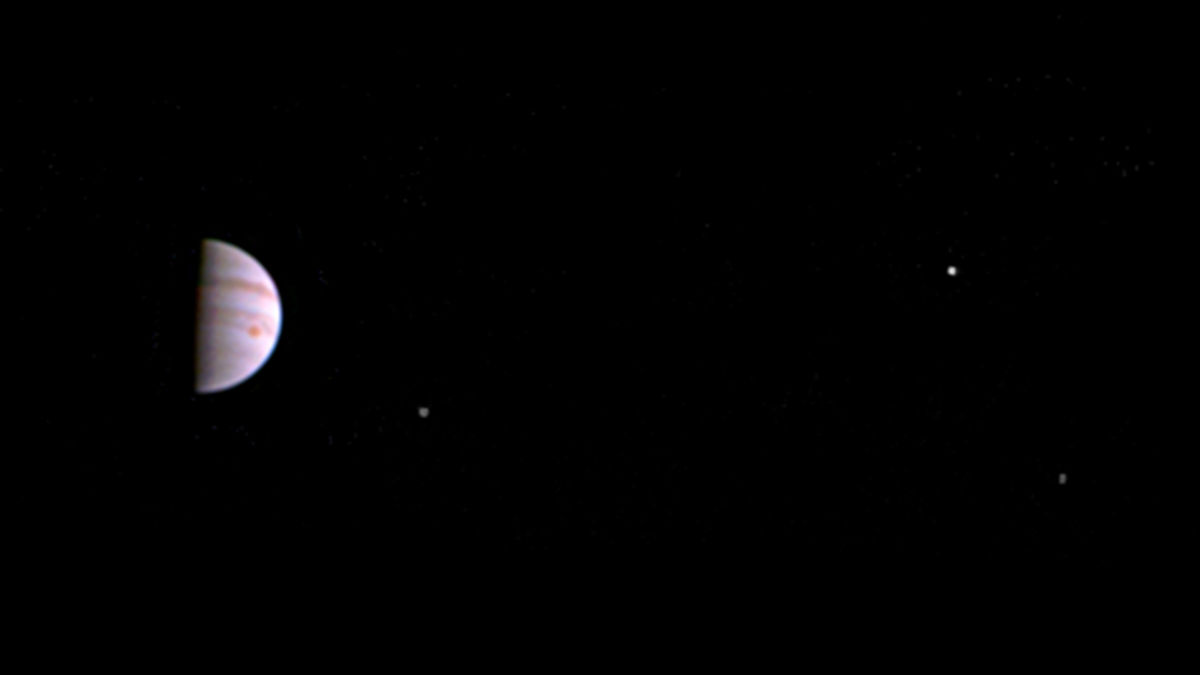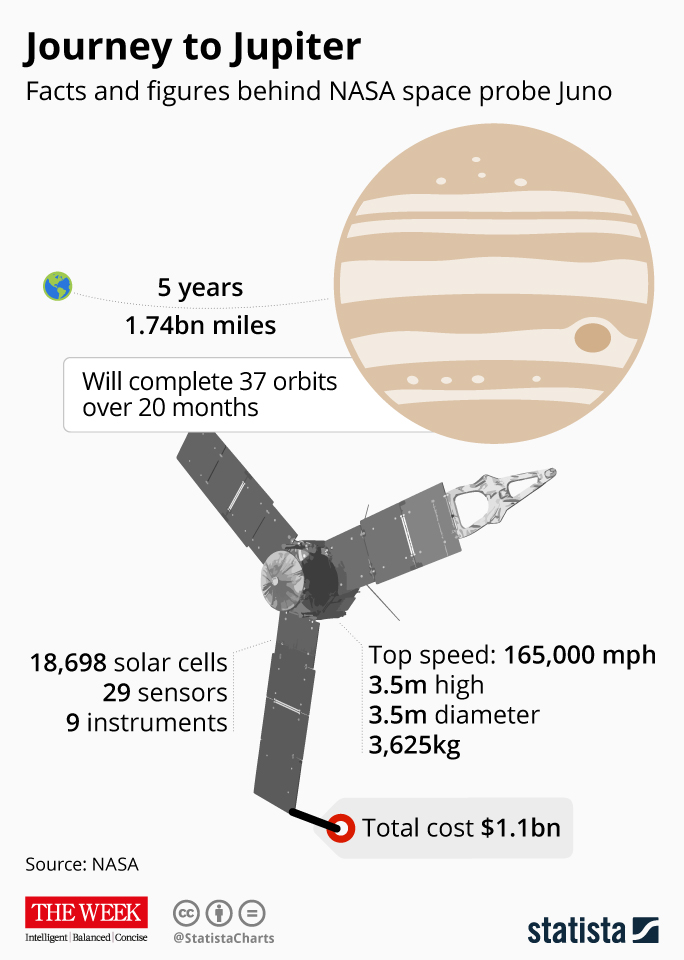Juno: Nasa spacecraft sends first images from Jupiter orbit
Detailed photos reveal gas planet's famous Great Red Spot and three of its moons

A free daily email with the biggest news stories of the day – and the best features from TheWeek.com
You are now subscribed
Your newsletter sign-up was successful
Nasa's Juno spacecraft has begun to send back pictures from its voyage to Jupiter, showing the giant planet half-obscured alongside three of its moons – Io, Europa and Ganymede.
It is the first glimpse of the giant gas planet taken by the spacecraft since it was successfully placed in orbit on 5 July, after nearly five years travelling through space, and reassured scientists Jupiter's extreme radiation had not damaged the probe at the end of its 1,740 million-mile journey.
"This scene from JunoCam indicates it survived its first pass through Jupiter's extreme radiation environment without any degradation and is ready to take on Jupiter," said principal scientist Scott Bolton. "We can't wait to see the first view of Jupiter's poles."
The Week
Escape your echo chamber. Get the facts behind the news, plus analysis from multiple perspectives.

Sign up for The Week's Free Newsletters
From our morning news briefing to a weekly Good News Newsletter, get the best of The Week delivered directly to your inbox.
From our morning news briefing to a weekly Good News Newsletter, get the best of The Week delivered directly to your inbox.
Bolton has previously described the task of ensuring Juno was captured by Jupiter's gravity to go into orbit as the "hardest thing Nasa has ever done".
Despite being taken 2.7 million miles away from the planet, the photos are detailed enough to capture some of Jupiter's atmospheric features, including the Great Red Spot. Higher resolution images will be transmitted on a closer flypast on 27 August.
Juno's initial capture orbit will last 53.5 days, with the spacecraft swooping between the planet and the belts of extreme radiation which surround it. At its closest point, the probe will be only 3,000 miles from Jupiter's cloud tops.
Jupiter's main gases, hydrogen and helium, are the same as those of the Sun, leading scientists to believe it was the first planet to form and that Juno's mission - to "investigate the planet's origins, interior structure, deep atmosphere and magnetosphere" – will reveal more about the origins of our solar system.
A free daily email with the biggest news stories of the day – and the best features from TheWeek.com
Nasa's Juno spacecraft arrives in Jupiter orbit
05 July
After a five-year journey through the solar system, Nasa's Juno spacecraft has successfully been placed in orbit around Jupiter.
Scientists in California waited anxiously as the spacecraft performed a 35-minute main-engine burn to slow itself down by 1,212mph to allow itself to be captured by Jupiter's gravity.
Cheers erupted after the spacecraft indicated the burn was complete and everything had gone as planned.
"Welcome to Jupiter," declared mission control.
The burn time was "within one second of the predicted time, putting it in exactly the orbit it needed", says The Guardian.
Juno chief scientist Scott Bolton described it as the "hardest thing Nasa has ever done".
"Engineers had warned in advance that the engine firing was fraught with danger," says the BBC. "No previous spacecraft has dared pass so close to Jupiter; its intense radiation belts can destroy unprotected electronics."

Juno will now orbit Jupiter 37 times over the next 20 months, travelling 2,600 miles above the planet, which is around 3,000 miles closer to the surface than any other mission.
Infographic provided by Statista for TheWeek.co.uk
-
 Film reviews: ‘Send Help’ and ‘Private Life’
Film reviews: ‘Send Help’ and ‘Private Life’Feature An office doormat is stranded alone with her awful boss and a frazzled therapist turns amateur murder investigator
-
 Movies to watch in February
Movies to watch in Februarythe week recommends Time travelers, multiverse hoppers and an Iraqi parable highlight this month’s offerings during the depths of winter
-
 ICE’s facial scanning is the tip of the surveillance iceberg
ICE’s facial scanning is the tip of the surveillance icebergIN THE SPOTLIGHT Federal troops are increasingly turning to high-tech tracking tools that push the boundaries of personal privacy
-
 Israel retrieves final hostage’s body from Gaza
Israel retrieves final hostage’s body from GazaSpeed Read The 24-year-old police officer was killed during the initial Hamas attack
-
 China’s Xi targets top general in growing purge
China’s Xi targets top general in growing purgeSpeed Read Zhang Youxia is being investigated over ‘grave violations’ of the law
-
 Panama and Canada are negotiating over a crucial copper mine
Panama and Canada are negotiating over a crucial copper mineIn the Spotlight Panama is set to make a final decision on the mine this summer
-
 Why Greenland’s natural resources are nearly impossible to mine
Why Greenland’s natural resources are nearly impossible to mineThe Explainer The country’s natural landscape makes the task extremely difficult
-
 Iran cuts internet as protests escalate
Iran cuts internet as protests escalateSpeed Reada Government buildings across the country have been set on fire
-
 US nabs ‘shadow’ tanker claimed by Russia
US nabs ‘shadow’ tanker claimed by RussiaSpeed Read The ship was one of two vessels seized by the US military
-
 What will happen in 2026? Predictions and events
What will happen in 2026? Predictions and eventsIn Depth The new year could bring peace in Ukraine or war in Venezuela, as Donald Trump prepares to host a highly politicised World Cup and Nasa returns to the Moon
-
 How Bulgaria’s government fell amid mass protests
How Bulgaria’s government fell amid mass protestsThe Explainer The country’s prime minister resigned as part of the fallout